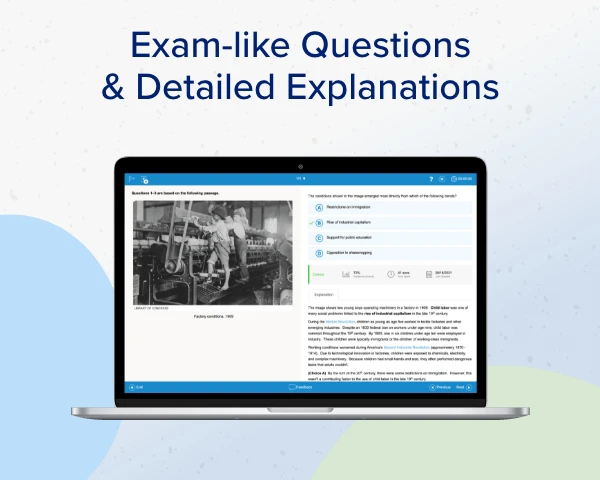Due to their intensity and demands, taking AP courses can be challenging. Students who adopt healthy and effective study habits are more likely to do well in their AP courses and have a solid foundation of skills to bring to college, allowing them to be more productive and successful in the future. By helping your students set goals, establish a consistent schedule, apply active study techniques, and use their resources effectively, your students will be able to create study habits that will carry them forward into the future.
Goal Setting
A fundamental element of creating effective study habits is setting specific goals with the end task in mind. You can establish a direction for your study time to make it more effective if you set a specific overall objective that you want to accomplish before you study. This could be a specific topic covered in class that you struggle with or an overarching concept that can be applied more broadly to the subject of the course.
Another key part of setting goals is breaking down your overall objective into smaller, more manageable pieces. Creating small goals along the way can help keep you motivated and committed to the overall task. By focusing on the achievements you are making along the way toward your end goal, you are more likely to stay focused on the content you are learning or reviewing. The best way to create small, manageable goals is to break apart your larger objective into smaller tasks that take no more than 5 to10 minutes to complete. For example, if your larger objective is to learn about World War II, you might set smaller goals of identifying the causes, looking at the parties involved, and analyzing the overall consequences. This process of breaking down concepts and topics can help you stay on task and be more productive.

Establishing a Consistent Study Schedule
Consistency is instrumental in building and maintaining habits in our lives. Studying is no different. If you want to create habits that are useful and that you can cultivate for college, it is important to schedule a definitive time period for studying. This could be daily or weekly, depending on the amount of time you have available. Carving out an intentional hour-long period every day to study for your AP courses can exponentially strengthen your knowledge and learned skills. Likewise, if you know that you will study best for an extended amount of time just one day a week, choosing to do so will be more beneficial than trying to fit in study time every day.
Creating a consistent study schedule can help you avoid having to cram for exams, relieving the stress that is associated with cramming. Oftentimes, students only study for big assessments right before they occur. This can make your studying more erratic and less focused, which can lead to a less productive study session. Cramming before an assessment can also lead to increased anxiety and stress that are not conducive to performing your best on it.
Active Study Techniques
When deciding how to study, it is important to use active study techniques that require you to interact with and apply the material instead of simply looking over your notes. Some examples of active study techniques are active recall and spaced repetition.
Active Recall
Active recall is about actively retrieving information in your brain rather than simply rereading study materials. The best way to achieve this is to create questions for yourself over the topics you are studying that force your brain to remember the information without using your notes. This can help you improve your long-term memory recall and understanding of the material, making study sessions more effective. According to multiple studies, students who use active recall are more likely to perform better on assessments than those who use more passive study techniques, such as just reading over their notes.
Spaced Repetition
Spaced repetition is another technique that requires you to actively participate in your study sessions. This technique involves reviewing the same topics or information repeatedly at specific intervals of time rather than reviewing the material once and then moving past it. Research has shown that people who review concepts consistently have better long-term retention of the material. This could be as easy as carving out just 10 minutes at the beginning or end of your study sessions to review previously studied material, continuing to go over concepts that are important to the course as a whole.

Study Strategies
Utilizing study strategies such as flashcards, quizzes, and summarized notes with these active study techniques can substantially increase your understanding and retention of the materials and concepts learned in class. Writing questions in your notes is another strategy you can use when reviewing material. As you review your notes, try asking yourself follow-up questions to deepen your understanding of the content, and consider any real-world implications of its concepts and ideas.
Using AP Resources Effectively
As an AP student, there are many tools at your disposal that can assist you in your learning. Some teacher-provided tools may include textbooks, online resources, and even study groups. While these are primarily used in the classroom, they can also be useful for studying outside of class.
Textbooks
Deeply reviewing textbook information on your own can help you slow down and analyze the material more effectively. You can also use active study techniques to dig deeper into the concepts and ideas at a pace that is more conducive to your individual learning style.
Online Resources
Online resources such as UWorld and AP Classroom can also benefit your study sessions and support your understanding of the material at a deeper level. UWorld specifically has guided lessons, study guides, and practice materials that can supplement in-class learning. Your teacher can assign these materials so you can use them in your study sessions outside of class.
Study Groups
Another good resource to help with outside learning is your peers! Forming study groups outside of class can help you review the material more effectively. Reading the information aloud, discussing each topic, concept, and idea, sharing viewpoints on the information covered, and even teaching each other can help you actively engage in the study process, increase your level of understanding, and improve your retention of the material. Just don’t forget to set your goals together — large or small — to keep yourselves on task.
Building Habits for Success
Creating and cultivating effective study habits is a key part of improving performance and understanding in AP courses. These habits are crucial skills that can extend beyond high school and support a better foundation for future success. As you take on your AP journey, keep in mind that the effort you put into building these habits now will pay off later. Stay focused, stay motivated, and enjoy the learning process!

Erin Nesbitt is an experienced educator currently teaching at Seguin High School in Arlington, Texas. While she has a passion for teaching English 4 and AP Literature and Composition, Erin has also instructed both on-level and advanced English 1, as well as English 3. Erin is committed to enhancing student engagement and learning outcomes through innovative and technology-integrated lessons. With a focus on fostering critical thinking and creativity, Erin strives to create an open and inclusive classroom environment that prepares students for future academic and professional success.





